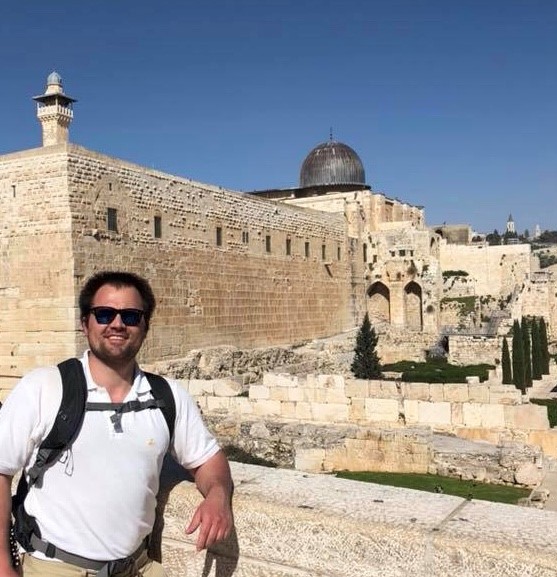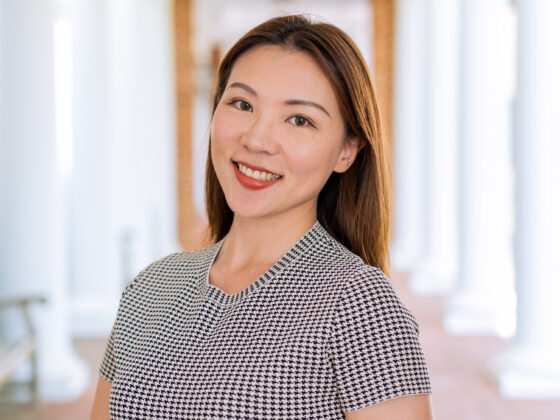Stewart Gray (Class of 2018) came to Darden after working for five years as a product analyst at Liberty Mutual Insurance in Boston, having previously completed his undergraduate degree at Dartmouth College. He recently participated in Darden’s course to Israel focused innovation and technology with Professor Yael Grushka-Cockayne. The following is a reflection on the experience in his own words:
I can’t say that I was at all sure what to expect out of the next two weeks as we touched down at Ben Gurion International Airport in Tel Aviv on March 14th. I knew the schedule and the narrative, but I was having trouble separating what seemed almost like marketing hype about the country from the reality of its innovation miracle over the last 70 years. While two weeks by no means makes me an expert of any sort, I can think of no better capstone to my Darden experience than getting to see across the spectrum of Israeli business from the bazaar-style shook markets to hi-tech companies and government offices, and even to get the opportunity to compare that to tourism-based entrepreneurship in Jordan, as a group of us took a three day excursion before the course to visit Petra, Wadi Rum, and a traditional Bedouin camp. I have tried to distill my myriad thoughts into a few key learnings that I believe are critically important to the Israeli innovation ecosystem, and that set it apart from what we see in the U.S.
Conflict and crisis are always present
Conflict is everywhere in Israel. It’s woven into the fabric of Israeli society in a way that is jarring at first for an outsider. It’s in the willingness to challenge authority. It’s in bartering and negotiating at markets. It’s in the Knesset (Israel’s parliament), the international arena, and the internal relationships with Gaza and the West Bank. These conflicts are both internal and external, and they form an integral part of what it means to be Israeli. It’s even in the geography: the arid expanse of the Negev desert spotted with inhabited oases. As we heard, these conflicts have made Israelis great at triage and crisis management, both important skills to an entrepreneur.
The ever-present external threats that the country faces also create a shared threat that orients each citizen in the same direction (the major engine of this being mandatory military service) at the same time as the society is one that features a high degree of personal freedom and accountability outside of military life. In the midst of the crisis and conflict, the military also creates a consistent thread of shared experience across class lines, and it begets a close network of strong social ties across socioeconomic lines that can be leveraged by entrepreneurs throughout the startup lifecycle.
This constant state of crisis management also creates a universal appreciation for the role of innovation in both military and economic success, and we saw this reflected in our talk at the Israeli Innovation Authority, as we heard about how the Authority’s startup project funding program is one of the few truly agreed upon line items across party lines in the Knesset.
Israel is a “both/and” culture, and so is its startup scene
Israel features a systematic integration of old and new, theory and practice, of seemingly opposite forces. On the one hand, Dr. Shmuel Harlap, billionaire majority shareholder of car importer Colmobil, has a Harvard Ph.D. in philosophy. On the other hand, he is a former commando, world class business leader, and a visionary in the future of mobility space. He is no more one of these things than the other, and there is a seamless integration there that we saw in his presentation style.
Similarly, Jon Medved, Founder and CEO of the venture capital equity crowdfunding platform OurCrowd, described his investment thesis to us as “deliberately polymorphically perverse”. The only criterion he and his team are judging is whether a target company has the capacity to change the world. This doesn’t mean they just bet the field and play for an average return, but they aren’t afraid to pivot, and they aren’t afraid to place multiple bets. This is how VC in the U.S. used to be, but more and more, the VC industry stateside invests in less “moonshot” style innovation and more in incremental advancements. I think this mindset on the part of informed VC investors was one of my biggest surprises of the trip, and I saw a similar philosophy in Dr. Eyal Kishon’s presentation on his VC firm, Genesis Partners.
There is no fear of failure……or fear of success
We heard a lot about the government and military programs and processes that encourage smart failure. To me, that was amazing in and of itself, as I don’t think there are many (if any) other places in the world where smart failure is tolerated writ large. At the same time, there is still an understanding of risk tolerance. In Israel, even politicians think like entrepreneurs. In our meeting with MK Roy Folkman, we saw very clearly that he understood the value of experimentation, results orientation, and affordable loss in both the public and private sectors.
However, Israel takes it even one step further: while they certainly aren’t afraid to fail, they also aren’t afraid to succeed. I suspect this flows from the crisis management bias for action, but throughout our presentations, I never once sensed any trepidation about the pace of technological progress (except that it wasn’t fast enough). In America, if you talk about AI or autonomous vehicles, people flinch. You’ll hear about the potential for big brother and for runaway AI, but Israeli entrepreneurs focus on the potential benefits and have a confidence that those are the elements that will come to fruition. The unsaid statement there seems to be that they’ll deal with the next problem when it happens, but today that is not the crisis at hand.
Systems thinkers and cross-pollinators win in innovation
Across our speakers, I also saw a keen awareness of the importance of the health of the ecosystem to Israel’s success. Indeed, at least three of our speakers spoke with scorn about the decline of Boston as a true hub of innovation as its ecosystem moved to Silicon Valley and NYC. I have never heard a government official talk about the spillovers in quite the way that the speaker from the Innovation Authority did. There was both a solid understanding of the economic mechanics of the spillovers and a conscious and measured plan to drive further innovation to unlock these externalities. The fact that the Innovation Authority’s mandate stretches across industries is also hugely important, as it means it is empowered to cross-pollinate among industries.
This systems thinking mindset is not limited to government officials. Their military trains people to understand how their actions are part of the larger whole, and to understand how to reduce the number of failures that occur (as we heard about in the discussion of daily briefings at the air force base we visited). The IDF also empowers people to and demands that they take actions to make improvements to processes. If that is how you are taught to tackle problems, then it is no surprise that as a leader, you see beyond the first order impacts of your actions.
Israel is not immune to many of the problems with entrepreneurship, and they know that
Inequality is an inherent byproduct of the startup ecosystem anywhere, but I was surprised when each of our government speakers (as well as a few of our industry speakers) readily admitted it. It was strange to me to see both this understanding and forthrightness. Their enterprise risk management, systems thinking approach to identifying risks is hugely important to continued success, and Israelis fully understand that innovation requires an ecosystem that must be constantly nurtured and protected. Moreover, they understand that continuous work lies ahead to afford equality of opportunity to currently excluded populations, such as the Israeli Arab and ultra-religious Jewish populations, and to future generations of Israeli entrepreneurs.





